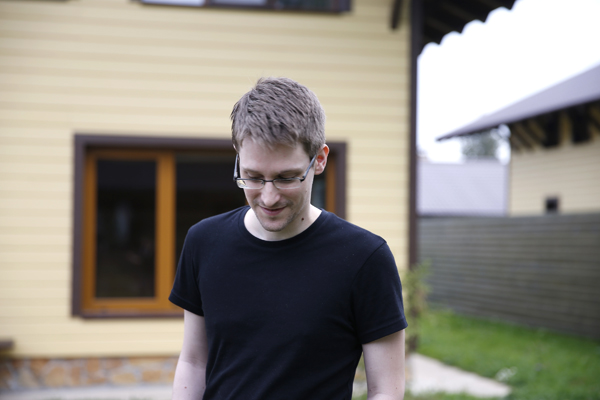The central, absorbing act of Citizenfour is viewing Edward Snowden like never before. He’s a human being in cinema verité close-up during the days when the computer contractor hands over United States government documents on the National Security Agency’s surveillance activities around the world to select journalists.
Holed up in a hotel room in Hong Kong in June 2013, the earnest, self-deprecating nerd sitting on the bed in a white T-shirt, or sometimes in a bathrobe, quietly explains the vast, mind-boggling scale of the data captured on phones, or via the Internet, within the U.S. As the enormity of what Snowden and the journalists are doing sinks in, he shyly hides his passwords by typing under a blanket, startles at every phone call and knock on the door, and reacts with great paranoia about open shades and repeated fire alarm tests. He worries about the impact on his family and the girlfriend he left back home in Hawaii with just a vague note. He leaves all the interpretation and judgment of what he’s done to the camera, the journalists interviewing him, and the public.
Some of how the director, Laura Poitras, got to that claustrophobic hotel room is seen on screen in act one, when she reveals the mysterious emails she received from a source signing as “Citizen four.” Not really explained here is that Snowden reached out to her because she was using extra-secure encryption software for all her communications. Her unusual caution grew out of her exploration on the expanded reach of surveillance, first in the 2012 short “The Program” in The New York Times continuing “Op-Docs” series.
It featured interviews and clips of lectures by crypto-mathematician William Binney, who after three decades working for the intelligence agencies, was alarmed that they had gone way too far, and he was even more determined to protest after the FBI raided his home at gunpoint when he went public (he wasn’t charged). Poitras intended this extended version to be the third in her revelatory post-9/11 America trilogy, following her superb Oscar nominated My Country, My Country (2006), about an anguished doctor reeling in post-invasion Iraq, and her Emmy-nominated The Oath (2010), about the radicalized family of a Guantánamo prisoner.
But she was stymied in continuing her work by being constantly stopped, searched, and held back in U.S. airports, knowing only hints that she was on some secret watch list. So, in a layer of post-Cold War irony, she moved to Berlin to minimize the security hassles, took security precautions, and used encryption programs that she identifies and thanks in the acknowledgments.
Part of the suspense in the film is her testing the validity of the anonymous source, online and after they meet up. (In an image of espionage a la Big Bang Theory, he’s the guy playing with the Rubik’s Cube when she first meets him in the hotel lobby.) She brings in other journalists to check his bona fides and then promulgate his information.
First is Glenn Greenwald, whose investigative journalism for print, online, and cable news outlets flows from his laptop connected by a mass of wires snaking through his colorful, verdant roost in Rio de Janeiro, Brazil. When Greenwald’s husband is later detained at London Heathrow Airport, in apparent government retaliation, it’s a sign that times have changed since the Cold War in that the men’s relationship itself is not a pressure point, and that a muckraking reporter could be bullied out of the profession altogether as portrayed in Michael Cuesta’s recent Kill the Messenger. Also brought in is Jeremy Scahill, whose reporting and filming last year in Dirty Wars was a similar combination of dogged paper trail, expert interviews, and on-the-ground research.
While Snowden over and over again insists to all that he is a whistle-blower, not a journalist, and it’s for them to determine what’s appropriate or a priority to publish, he keeps putting more pressure on them to release the information as soon as possible, both to protect him as his disappearance from work could raise suspicions, and out of boyish excitement over what they’re doing. They all watch impatiently, then enthralled, as the coverage of the resulting articles catches fire around the world, with the whirlwind act three follow-up of the drama of Snowden’s well-known subsequent flight to Russia.
That speed leads to the same questions that were raised in Alex Gibney’s We Steal Secrets: The Story of WikiLeaks last year (its subject, Julian Assange, is glimpsed negotiating sanctuary for Snowden): treating these documents either like fast-breaking news or as objects in a crusade for total transparency doesn’t allow for the careful screening and weighing of what to use, particularly in letting names or sensitive material through. Other recent documentaries on whistle-blowers discussed more weighing these factors, from the past, 1971, and present, Silenced.
This film is “dedicated to those who make great sacrifices to expose injustice,” and for such a politically explosive story with a director’s personal involvement, Poitras’s style contrasts with Michael Moore’s bombastic polemics, like in the related Fahrenheit 9/11. Surprisingly, instead, she continues to use more the intimate aesthetics of documentarians who mine their connections to family subjects, like Alan Berliner (First Cousin Once Removed) and Ross McElwee (Bright Leaves). Her technique makes it much more possible to look carefully within the eye of the storm than any Frontline or 60 Minutes interview would do. HBO will air the documentary next year, but you will want to discuss it before then.

















Leave A Comment